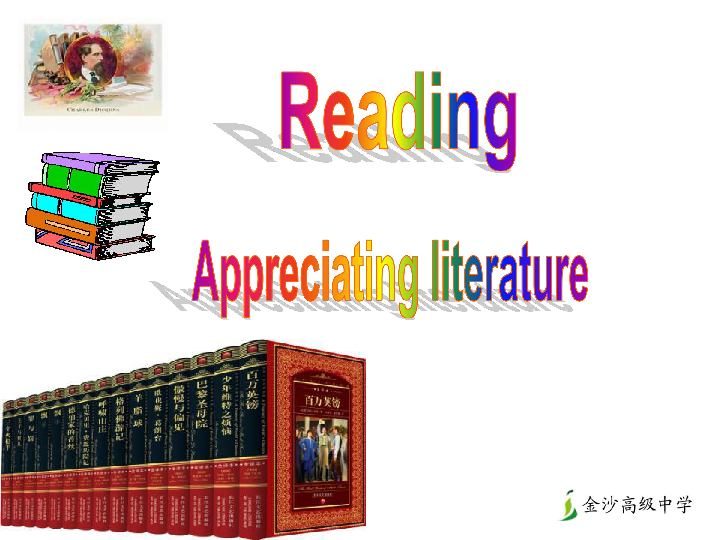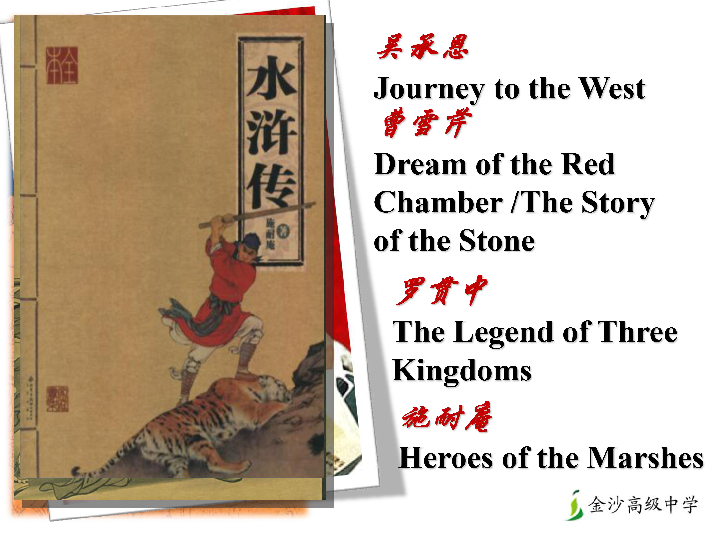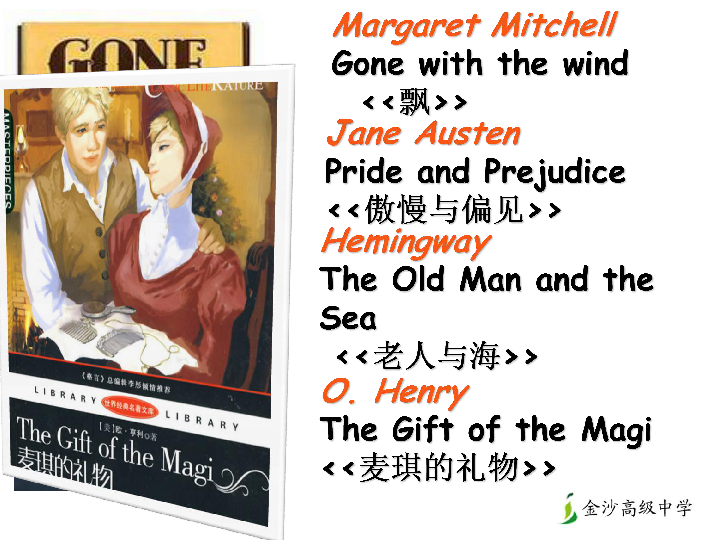Unit 1 The written world Reading(1):Appreciating literature 课件(23张PPT)
文档属性
| 名称 | Unit 1 The written world Reading(1):Appreciating literature 课件(23张PPT) |

|
|
| 格式 | zip | ||
| 文件大小 | 6.3MB | ||
| 资源类型 | 教案 | ||
| 版本资源 | 牛津译林版 | ||
| 科目 | 英语 | ||
| 更新时间 | 2020-02-28 00:00:00 | ||
图片预览





文档简介
(共23张PPT)
If I had plenty of time to kill, I would ...
吴承恩
Journey to the West
曹雪芹 Dream of the Red Chamber /The Story of the Stone
罗贯中
The Legend of Three Kingdoms
施耐庵
Heroes of the Marshes
Margaret Mitchell Gone with the wind <<飘>>
Jane Austen
Pride and Prejudice
<<傲慢与偏见>>
Hemingway
The Old Man and the Sea <<老人与海>>
O. Henry
The Gift of the Magi
<<麦琪的礼物>>
Do you know this person?
Guess who he is according to the clues.
Clue 1: He is one of England’s greatest writers.
Clue 2: He wrote many classic novels, including David Copperfield,?Oliver Twist?and Great Expectations.
Who is he?
Charles Dickens was born on 7
February 1812 in Portsmouth,
England. He had a happy
childhood after his family moved
to Chatham. At the age of 12,
Dickens had to leave school
because his father was imprisoned for debt. The poverty and adversity Dickens experienced as a child greatly influenced his later views on social reform. Before his death on 9 June 1870, he wrote about 15 major novels and many short stories, most of which are famous for their surprising endings.
Works by Charles Dickens
《雾都孤儿》
《圣诞颂歌》
《双城记》
《艰难时世》
《远大前程》
《大卫·科波菲尔》
《Great Expectations 》
《Oliver Twist》
《A Christmas Carol》
《Hard Times》
《A Tale of Two Cities》
《David Copperfield》
These best-known works are so well written that people still love them nowadays. Many classic novels are made into films.
Let’s listen to the recording of the reading part to learn more about this great writer and his best-known works.
Skimming
for
general ideas
Analyze the structure:
Part 1: D_________ of classic literature.
Part 2: Charles Dickens--England's greatest n_____.
Part 3: Brief i_________ of Great Expectations.
efinition
ntroduction
ovelist
Classics are the ______ of the literary world, including _____, _____, and _____ that were w_____ a long time ago and are well r_______ by people nowadays.
antiques
novels
plays
poems
eceived
ritten
difficult
to read
old
and
boring
have
nothing to
do with
life today
Do the majority like reading classic literature? Why?
Scanning
for
specific information
Identify True (T) or False (F).
1. The language characteristics of classics
are quite different from those of modern
works.
2. Many people do not read classics,
because they think classics are old and
boring and have nothing to do with life
today.
3. In 1998, Great Expectations appeared in
cinemas.
与……不同
和……无关
4. Charles Dickens was at his sixties when
he died in 1870.
5. Great Expectations was set in England in
the 18th century.
6. When the story begins, Pip is five
years old.
7. Pip learns that wealth does not buy
happiness in the end.
58
the early 1800s.
seven
Match the elements on the left with the
correct examples on the right. (P4C2)
1. characters a. mist
2. setting b. what it means to be a
gentleman
3. symbol c. England in the early 1800s
4. plot d. Pip, Joe, Estella
e. a stranger gives Pip a lot
5. theme of money, then Pip moves
to London and becomes
ashamed of his background
enjoy
differs
made/adapted
Setting
Theme
while
condition
determined
learning
count
According to the passage and finish the form.
This passage is a persuasive essay.
The author wants us to appreciate classic literature.
At the start, she asks us to change our minds about classic literature.
Then she gives us interesting facts about Charles Dickens and his book Great Expectations.
She gives us enough information to make us interested, but not enough to give away the story.
1. What does a persuasive essay try to do?
2. What’s the writer’s point of view in this essay?
3. How does the author try to convince the reader?
In this persuasive essay, how does the author try to convince us to appreciate classic literature?
1. What does a persuasive essay try to do?
2. What’s the writer’s point of view in this essay?
3. How does the author try to convince the reader?
Discussion:
What does it really mean to be a gentleman?
Today a reader,
tomorrow a leader.
1. Read the text again and try to retell the story of Great Expectations.
2. Think of some possible endings for the novel and write it down.
If I had plenty of time to kill, I would ...
吴承恩
Journey to the West
曹雪芹 Dream of the Red Chamber /The Story of the Stone
罗贯中
The Legend of Three Kingdoms
施耐庵
Heroes of the Marshes
Margaret Mitchell Gone with the wind <<飘>>
Jane Austen
Pride and Prejudice
<<傲慢与偏见>>
Hemingway
The Old Man and the Sea <<老人与海>>
O. Henry
The Gift of the Magi
<<麦琪的礼物>>
Do you know this person?
Guess who he is according to the clues.
Clue 1: He is one of England’s greatest writers.
Clue 2: He wrote many classic novels, including David Copperfield,?Oliver Twist?and Great Expectations.
Who is he?
Charles Dickens was born on 7
February 1812 in Portsmouth,
England. He had a happy
childhood after his family moved
to Chatham. At the age of 12,
Dickens had to leave school
because his father was imprisoned for debt. The poverty and adversity Dickens experienced as a child greatly influenced his later views on social reform. Before his death on 9 June 1870, he wrote about 15 major novels and many short stories, most of which are famous for their surprising endings.
Works by Charles Dickens
《雾都孤儿》
《圣诞颂歌》
《双城记》
《艰难时世》
《远大前程》
《大卫·科波菲尔》
《Great Expectations 》
《Oliver Twist》
《A Christmas Carol》
《Hard Times》
《A Tale of Two Cities》
《David Copperfield》
These best-known works are so well written that people still love them nowadays. Many classic novels are made into films.
Let’s listen to the recording of the reading part to learn more about this great writer and his best-known works.
Skimming
for
general ideas
Analyze the structure:
Part 1: D_________ of classic literature.
Part 2: Charles Dickens--England's greatest n_____.
Part 3: Brief i_________ of Great Expectations.
efinition
ntroduction
ovelist
Classics are the ______ of the literary world, including _____, _____, and _____ that were w_____ a long time ago and are well r_______ by people nowadays.
antiques
novels
plays
poems
eceived
ritten
difficult
to read
old
and
boring
have
nothing to
do with
life today
Do the majority like reading classic literature? Why?
Scanning
for
specific information
Identify True (T) or False (F).
1. The language characteristics of classics
are quite different from those of modern
works.
2. Many people do not read classics,
because they think classics are old and
boring and have nothing to do with life
today.
3. In 1998, Great Expectations appeared in
cinemas.
与……不同
和……无关
4. Charles Dickens was at his sixties when
he died in 1870.
5. Great Expectations was set in England in
the 18th century.
6. When the story begins, Pip is five
years old.
7. Pip learns that wealth does not buy
happiness in the end.
58
the early 1800s.
seven
Match the elements on the left with the
correct examples on the right. (P4C2)
1. characters a. mist
2. setting b. what it means to be a
gentleman
3. symbol c. England in the early 1800s
4. plot d. Pip, Joe, Estella
e. a stranger gives Pip a lot
5. theme of money, then Pip moves
to London and becomes
ashamed of his background
enjoy
differs
made/adapted
Setting
Theme
while
condition
determined
learning
count
According to the passage and finish the form.
This passage is a persuasive essay.
The author wants us to appreciate classic literature.
At the start, she asks us to change our minds about classic literature.
Then she gives us interesting facts about Charles Dickens and his book Great Expectations.
She gives us enough information to make us interested, but not enough to give away the story.
1. What does a persuasive essay try to do?
2. What’s the writer’s point of view in this essay?
3. How does the author try to convince the reader?
In this persuasive essay, how does the author try to convince us to appreciate classic literature?
1. What does a persuasive essay try to do?
2. What’s the writer’s point of view in this essay?
3. How does the author try to convince the reader?
Discussion:
What does it really mean to be a gentleman?
Today a reader,
tomorrow a leader.
1. Read the text again and try to retell the story of Great Expectations.
2. Think of some possible endings for the novel and write it down.
